英语课程与教学论新编
英语课程与教学论课程思政案例范文
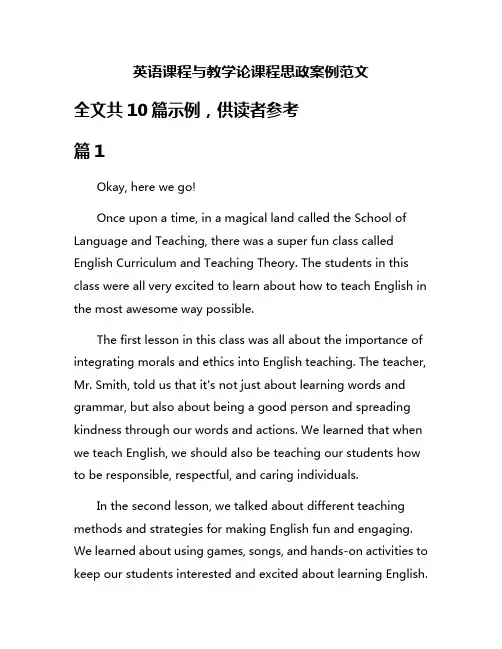
英语课程与教学论课程思政案例范文全文共10篇示例,供读者参考篇1Okay, here we go!Once upon a time, in a magical land called the School of Language and Teaching, there was a super fun class called English Curriculum and Teaching Theory. The students in this class were all very excited to learn about how to teach English in the most awesome way possible.The first lesson in this class was all about the importance of integrating morals and ethics into English teaching. The teacher, Mr. Smith, told us that it's not just about learning words and grammar, but also about being a good person and spreading kindness through our words and actions. We learned that when we teach English, we should also be teaching our students how to be responsible, respectful, and caring individuals.In the second lesson, we talked about different teaching methods and strategies for making English fun and engaging. We learned about using games, songs, and hands-on activities to keep our students interested and excited about learning English.Mr. Smith showed us how to create lesson plans that are interactive and creative, so that our students can have a blast while learning.The third lesson was all about creating a positive and inclusive classroom environment. We learned that as teachers,it's important to make all of our students feel welcome and accepted, regardless of their background or abilities. Mr. Smith taught us how to foster a sense of community and teamwork in the classroom, so that everyone can feel like they belong and can succeed.In the final lesson, we discussed the ways in which English teaching can be a powerful tool for promoting cultural understanding and diversity. We learned that by teaching English, we can help our students appreciate and respect different cultures and traditions from around the world. Mr. Smith encouraged us to celebrate diversity in our classrooms and to always be open-minded and accepting of different perspectives.In conclusion, the English Curriculum and Teaching Theory class was not just about learning how to teach English, but also about becoming better people and educators. We learned that by integrating morals and ethics into our teaching, using fun and engaging methods, creating inclusive classroom environments,and promoting cultural understanding, we can truly make a difference in the lives of our students. And that, my friends, is the true magic of English teaching!篇2Title: My Thoughts on English Curriculum and Teaching PhilosophyHello everyone! Today, I want to share with you my thoughts on the English curriculum and teaching philosophy. English is a very important subject for us and it's something that we use in our daily lives. I believe that the way we learn English should be fun and interesting so that we can enjoy the process of learning.First of all, I think that the English curriculum should include a variety of activities that cater to different learning styles. Some of us may learn better through visual aids, while others may prefer hands-on activities. By incorporating a mix of activities such as games, songs, and group projects, we can make learning English more engaging and effective.Secondly, I believe that the teaching philosophy for English should focus on building confidence and encouraging creativity. English can be a challenging subject for some of us, but with the right support and encouragement, we can all succeed. Teachersshould create a positive and nurturing environment where students feel safe to make mistakes and express themselves freely.Furthermore, I think that real-life applications of English should be integrated into the curriculum. For example, we can practice English by writing emails to pen pals from other countries or by conducting interviews with native speakers. By using English in practical contexts, we can improve our language skills and appreciate the importance of learning English in today's globalized world.In conclusion, I believe that the English curriculum and teaching philosophy should be dynamic, engaging, and student-centered. By incorporating a variety of activities, focusing on building confidence, and integrating real-life applications, we can make learning English a fun and rewarding experience for all of us. Thank you for listening to my thoughts!篇3Title: My English Class and Teaching PhilosophyHey guys! Today I want to talk about my English class and how we can learn English in a fun and effective way. English is soimportant because it can help us communicate with people from all over the world.In my English class, my teacher always makes sure that we have a good time while learning. She uses games, songs, and interesting activities to help us remember new words and grammar rules. We play games like word bingo, charades, and spelling races. These games make learning English so much fun!My teacher also encourages us to speak up in class. She creates a safe and supportive environment where we can practice speaking without feeling embarrassed. She helps us improve our pronunciation and grammar by giving us feedback and corrections.I think English class is not just about learning the language, but also about learning about different cultures and ways of thinking. My teacher always tells us interesting stories about life in English-speaking countries. This makes me want to travel and explore the world.In conclusion, my English class is not just a place to study grammar and vocabulary, but a place to have fun, express ourselves, and learn about the world. I am so grateful to have such an amazing teacher who inspires me to love English andbecome a better person. Thank you for listening to my thoughts on English class!篇4Hello everyone, today I'm going to tell you about my English class and teaching philosophy. I believe that English is very important because it helps us communicate with people from all over the world. In my class, we have a lot of fun activities to help us learn English. We play games, sing songs, and even do skits in English!One of my favorite activities is when we do role plays. We pretend to be in different situations and practice speaking English with each other. It's so much fun and it really helps us improve our speaking skills. Another thing I love to do in my class is read books. Reading in English helps us learn new words and improve our reading comprehension.As a teacher, I believe in creating a positive and inclusive learning environment. I want all of my students to feel comfortable and confident in expressing themselves in English. I also believe in using a variety of teaching methods to cater to different learning styles. Some students are visual learners, so I use pictures and videos to help them understand the lesson.Others learn better through listening, so I play recordings of native English speakers for them to listen to.Overall, I think it's important for my students to see the value in learning English. It's not just about passing a test, it's about opening up new opportunities and connecting with people from different cultures. I hope that my English class can inspire my students to continue learning and growing in their English proficiency. Thank you for listening!篇5Title: My Thoughts on English Classes and Teaching PhilosophyHi guys! Today I want to talk about something super cool - English classes and how we can learn all the exciting stuff while having fun! So buckle up and let's dive into the world of English learning!First of all, English classes should be fun and interactive, don't you think? I mean, who wants to sit in a boring class listening to a teacher talk for hours? Not me! I think we should play games, sing songs, and do lots of activities to practice our English skills. That way, we can learn better and remember things more easily.Next, I think it's important for teachers to be super nice and supportive. If we make mistakes, they should help us learn from them instead of getting mad. Learning a new language can be hard, so we need all the encouragement we can get!Also, I think it's cool when teachers use real-life examples in their lessons. It helps us understand how we can use English in the world outside the classroom. For example, we can learn how to order food at a restaurant, ask for directions, or even chat with new friends in English. That's so fun!Lastly, I believe that English classes should inspire us to keep learning and improving. We should set goals for ourselves, like speaking fluently or reading a book in English. With hard work and determination, we can achieve anything!In conclusion, English classes should be fun, interactive, supportive, and inspiring. Let's make the most of our learning journey and become awesome English speakers together! Thank you for listening to my thoughts, guys! Let's rock our English classes!Love,(Your Name)篇6Title: My Thoughts on English Curriculum and Teaching PhilosophyHi everyone! Today, I want to talk about English curriculum and teaching philosophy. It's super important to learn English well because it's a global language and can help us communicate with people from all around the world.First, let's talk about the English curriculum. I think it's important to have a good mix of reading, writing, speaking, and listening in our English classes. Reading can help us improve our vocabulary and grammar, while writing can help us express our ideas and thoughts. Speaking and listening are also super important because we need to be able to talk to others in English.Next, let's talk about teaching philosophy. I think it's important for teachers to be patient and supportive. Sometimes learning English can be hard, but if our teachers are there to help us and encourage us, it can make a big difference. Teachers should also make their lessons fun and engaging, so we can enjoy learning English and want to keep improving.In conclusion, learning English is super important and can open up so many opportunities for us. By having a good English curriculum and supportive teachers, we can all become confidentEnglish speakers. Let's keep practicing and never give up! Thank you for listening to my thoughts on English curriculum and teaching philosophy.篇7My English Class and Teaching PhilosophyHey guys! Today I want to talk to you about my English class and teaching philosophy.In my English class, we have a lot of fun while learning. We play games, listen to music, watch videos, and do all kinds of activities to help us improve our English skills. I always try to make my lessons interesting and interactive so that everyone can feel engaged and motivated to learn.One of the things I focus on in my English class is speaking. I believe that practice makes perfect, so I always encourage my students to speak up and participate in class discussions. I create a safe and supportive environment where everyone feels comfortable expressing themselves in English.Another important aspect of my teaching philosophy is cultural awareness. I believe that learning a language is not just about grammar and vocabulary, but also about understandingdifferent cultures and perspectives. I like to incorporate cultural activities and discussions into my lessons to broaden my students' horizons and encourage empathy andopen-mindedness.Overall, my goal as an English teacher is to inspire my students to love the English language and help them become confident and proficient communicators. I believe that language learning should be a fun and enriching experience that empowers students to connect with the world around them. Thank you for listening, and I hope you enjoyed hearing about my English class and teaching philosophy!篇8Title: My Thoughts on English Curriculum and Teaching PhilosophyHi everyone! Today I want to talk about English curriculum and teaching philosophy. English is super important because it helps us communicate with people all around the world. So, it's really cool to learn English well.First, let's talk about the English curriculum. I think it's important for the curriculum to be fun and interesting. Learning English can be kind of hard, so it's good if the lessons areengaging. For example, we can play games, sing songs, and do projects to help us remember new words and grammar rules. Oh, and it's also great if we have a lot of practice speaking and writing in English. That way, we can get better at using the language.Next, let's chat about teaching philosophy. I believe that teachers should be friendly and patient. Learning English can be tough, so it's nice to have a teacher who is supportive and understanding. It's also cool if the teacher can make the lessons fun and exciting. For example, they can use props, show videos, or even take us on field trips to practice our English in areal-world setting. That would be awesome!In conclusion, I think English curriculum and teaching philosophy should be creative, engaging, and supportive. If we have fun while learning English, we'll improve a lot and become fluent speakers. So, let's work hard and have a great time learning English together! Thank you for listening to my thoughts on this topic. Have a great day!篇9Title: Let's Learn about English Curriculum and Teaching TheoryHi guys! Today, we are going to talk about English curriculum and teaching theory. It may sound fancy, but don't worry, I'll explain it in a fun and easy way!First, let's understand what curriculum means. Curriculum is like a roadmap for teachers to follow when they are teaching a subject. It tells them what topics to cover, how to teach them, and what students should learn. So, in English class, curriculum will include things like grammar, vocabulary, reading, and writing.Next, let's talk about teaching theory. Teaching theory is like a set of rules or guidelines that teachers can use to make their classes more effective. For English teachers, teaching theory may include methods like total physical response (TPR), communicative language teaching (CLT), or task-based learning. These methods help teachers engage students, make learning fun, and improve their English skills.Now, let's look at an example to understand how English curriculum and teaching theory work together. Let's say we are learning about animals in English class. The curriculum may include learning new animal vocabulary, reading a story about animals, and writing a short essay about our favorite animal. The teacher may use teaching theory like TPR to act out animalactions, CLT to practice speaking about animals with classmates, and task-based learning to research information about different animals.In conclusion, English curriculum and teaching theory are important parts of learning English. They help teachers plan their lessons and make learning fun and effective for students. So, next time you are in English class, remember to pay attention to the curriculum and teaching methods your teacher uses. Happy learning!篇10English Class and Teaching Theory Course Ideological and Political ExamplesHey guys, have you ever thought about how our English class is related to ideology and politics? Let me tell you about it in a fun and easy way!First of all, let's talk about the English class. In our English class, we learn a lot of things like grammar, vocabulary, and speaking skills. But do you know that English is not just a language? It is also a window to the world. By learning English, we can understand different cultures, communicate with people from different countries, and even develop a global perspective.Now, let's move on to the teaching theory course. In this course, we learn about different teaching methods, classroom management, and how to motivate students. But did you know that teaching is also a way to pass on ideology and values? As teachers, we have the responsibility to instill positive values in our students, such as respect, empathy, and tolerance.So, how can we integrate ideology and politics into our English class? One way is to choose reading materials that reflect different perspectives and promote critical thinking. For example, we can read a book about cultural diversity or a news article about current events. Through discussions and debates, students can learn to analyze information critically and form their own opinions.Another way is to incorporate current events and social issues into our lessons. For example, we can discuss topics like climate change, human rights, or gender equality. By doing so, we can raise students' awareness of important issues and encourage them to take action.In conclusion, English class and teaching theory course are not just about learning language and teaching methods. They are also about promoting positive values, critical thinking, and social awareness. By integrating ideology and politics into ourlessons, we can help students become responsible global citizens.So, let's continue to learn English and teach with a purpose! Let's make a difference in the world!。
英语课程与教学论(1)

(2)Theory of learning
The theory of learning underlying the Grammar-Translation Method was Faculty Psychology.
3. Basic Principles
(1)Main features (2)Objectives (3)Techniques (4)Exemplification
The Grammar-Translation Method
1. 2. 3. 4. Background Theoretical Basis Basic Principles Summary and Comments
1. Background
(1)The history of the Grammar-Translation Method is not fully and carefully documented. However, there is evidence that grammar analysis and translation began to be the basic procedures in foreign language teaching from the 16th century. (2)The second impetus for the procedures of grammar analysis and translation in teaching Latin came from the social needs of European countries.
英语课程与教学论新编
Chapter 12
Schools of English Teaching Methodology
英语课程与教学论第二版课程内容
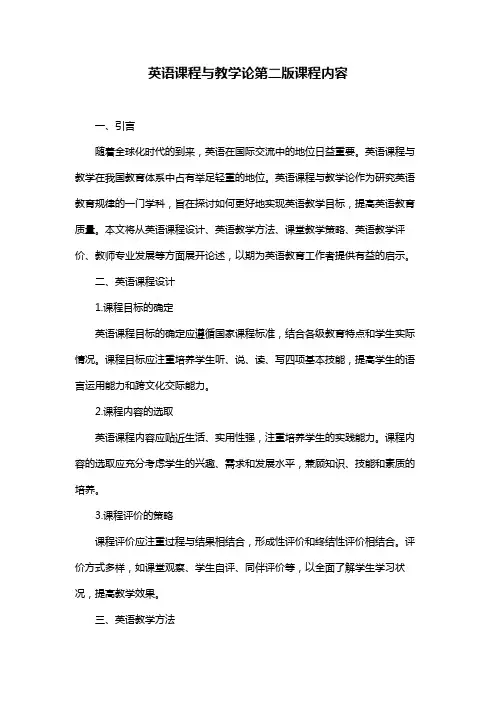
英语课程与教学论第二版课程内容一、引言随着全球化时代的到来,英语在国际交流中的地位日益重要。
英语课程与教学在我国教育体系中占有举足轻重的地位。
英语课程与教学论作为研究英语教育规律的一门学科,旨在探讨如何更好地实现英语教学目标,提高英语教育质量。
本文将从英语课程设计、英语教学方法、课堂教学策略、英语教学评价、教师专业发展等方面展开论述,以期为英语教育工作者提供有益的启示。
二、英语课程设计1.课程目标的确定英语课程目标的确定应遵循国家课程标准,结合各级教育特点和学生实际情况。
课程目标应注重培养学生听、说、读、写四项基本技能,提高学生的语言运用能力和跨文化交际能力。
2.课程内容的选取英语课程内容应贴近生活、实用性强,注重培养学生的实践能力。
课程内容的选取应充分考虑学生的兴趣、需求和发展水平,兼顾知识、技能和素质的培养。
3.课程评价的策略课程评价应注重过程与结果相结合,形成性评价和终结性评价相结合。
评价方式多样,如课堂观察、学生自评、同伴评价等,以全面了解学生学习状况,提高教学效果。
三、英语教学方法1.口语教学法口语教学法注重学生在实际语境中进行语言交流,提高学生的口头表达能力。
教师可通过组织课堂讨论、角色扮演等活动,让学生在实践中掌握英语口语。
2.听力教学法听力教学法着重培养学生的英语听力技能。
教师可利用多媒体教学手段,如录音、视频等,为学生提供丰富的听力素材,提高学生的听力水平。
3.阅读教学法阅读教学法旨在提高学生的英语阅读能力。
教师可通过讲解阅读策略、组织阅读活动等方式,帮助学生掌握阅读技巧,培养良好的阅读习惯。
4.写作教学法写作教学法关注学生书面表达能力的培养。
教师可通过指导写作技巧、提供写作示范等途径,引导学生完成不同类型的写作任务,提高写作质量。
四、课堂教学策略1.任务型教学法任务型教学法以任务为载体,让学生在完成任务的过程中学习英语。
教师设计具有挑战性、趣味性的任务,激发学生学习兴趣,提高课堂参与度。
课程与教学论(英语学科)
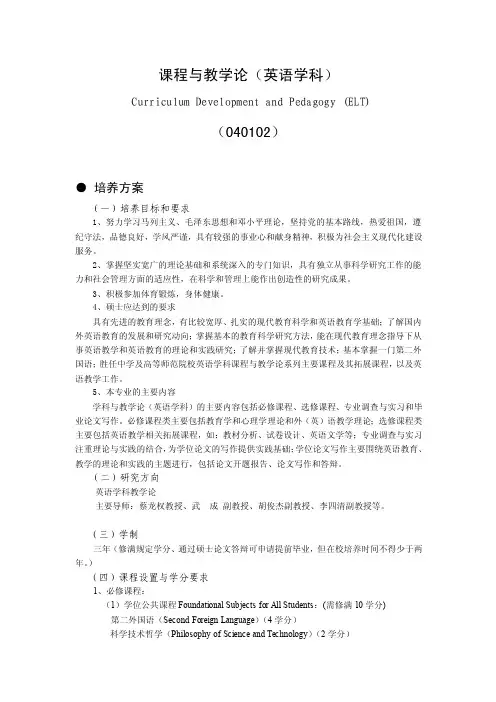
课程与教学论(英语学科)Curriculum Development and Pedagogy (ELT)(040102)●培养方案(一)培养目标和要求1、努力学习马列主义、毛泽东思想和邓小平理论,坚持党的基本路线,热爱祖国,遵纪守法,品德良好,学风严谨,具有较强的事业心和献身精神,积极为社会主义现代化建设服务。
2、掌握坚实宽广的理论基础和系统深入的专门知识,具有独立从事科学研究工作的能力和社会管理方面的适应性,在科学和管理上能作出创造性的研究成果。
3、积极参加体育锻炼,身体健康。
4、硕士应达到的要求具有先进的教育理念,有比较宽厚、扎实的现代教育科学和英语教育学基础;了解国内外英语教育的发展和研究动向;掌握基本的教育科学研究方法,能在现代教育理念指导下从事英语教学和英语教育的理论和实践研究;了解并掌握现代教育技术;基本掌握一门第二外国语;胜任中学及高等师范院校英语学科课程与教学论系列主要课程及其拓展课程,以及英语教学工作。
5、本专业的主要内容学科与教学论(英语学科)的主要内容包括必修课程、选修课程、专业调查与实习和毕业论文写作。
必修课程类主要包括教育学和心理学理论和外(英)语教学理论;选修课程类主要包括英语教学相关拓展课程,如:教材分析、试卷设计、英语文学等;专业调查与实习注重理论与实践的结合,为学位论文的写作提供实践基础;学位论文写作主要围绕英语教育、教学的理论和实践的主题进行,包括论文开题报告、论文写作和答辩。
(二)研究方向英语学科教学论主要导师:蔡龙权教授、武成副教授、胡俊杰副教授、李四清副教授等。
(三)学制三年(修满规定学分、通过硕士论文答辩可申请提前毕业,但在校培养时间不得少于两年。
)(四)课程设置与学分要求1、必修课程:(1)学位公共课程Foundational Subjects for All Students:(需修满10学分) 第二外国语(Second Foreign Language)(4学分)科学技术哲学(Philosophy of Science and Technology)(2学分)科学社会主义理论与实践(Theory and Practice of Scientific Socialism)(2学分)计算机基础(Basics of Computer)(2学分)(2)学位专业课Specialist Subjects & Options学位基础课:Specialist Subjects (需修满12学分)外语研究方法与学术论文写作Methodology for Foreign Language Research and Academic Writing(3学分)外语教学法研究Theory and Practice in ELT(3学分)语言学Linguistics(3学分)现代教学论Modern Pedagogy (3学分)教育心理学Educational Psychology (3学分)学位专业课:Specialist Options (需修满6学分)语音学Phonetics(2学分)句法学Syntax(2学分)语义学Semantics(2学分)语用学Pragmatics(2学分)应用语言学Applied Linguistics(2学分)客场与教材设计Curriculum and Teaching Materials(2学分)认知语言学Cognitive Linguistics(2学分)第二语言习得Second Language Acquisition(2学分)语料库语言学Corpus Linguistics (2学分)英语语言测试English Language Testing(2学分)2、选修课程Optional Subjects (需修满4学分)语言与文化Language and Culture(2学分)语篇分析Discourse Analysis(2学分)社会语言学Sociolinguistics(2学分)学习策略Learning Strategies(2学分)心理语言学Psycholinguistics(2学分)隐喻研究Research of Metaphor(2学分)中西翻译理论Chinese and Western Translation Theories(2学分)功能语法Functional Grammar(2学分)实用文本翻译Translation of Practical Texts(2学分)注:一专业与方向的学位专业课程均可作为另一专业与方向的选修课程,学分均为2。
大三英语课程与教学论
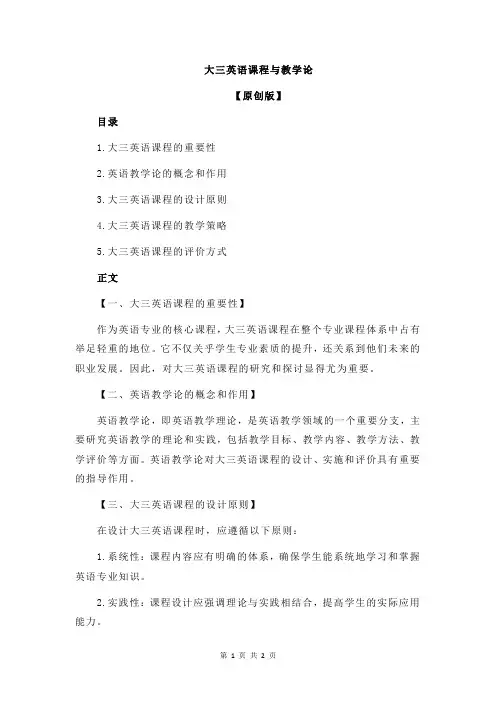
大三英语课程与教学论【原创版】目录1.大三英语课程的重要性2.英语教学论的概念和作用3.大三英语课程的设计原则4.大三英语课程的教学策略5.大三英语课程的评价方式正文【一、大三英语课程的重要性】作为英语专业的核心课程,大三英语课程在整个专业课程体系中占有举足轻重的地位。
它不仅关乎学生专业素质的提升,还关系到他们未来的职业发展。
因此,对大三英语课程的研究和探讨显得尤为重要。
【二、英语教学论的概念和作用】英语教学论,即英语教学理论,是英语教学领域的一个重要分支,主要研究英语教学的理论和实践,包括教学目标、教学内容、教学方法、教学评价等方面。
英语教学论对大三英语课程的设计、实施和评价具有重要的指导作用。
【三、大三英语课程的设计原则】在设计大三英语课程时,应遵循以下原则:1.系统性:课程内容应有明确的体系,确保学生能系统地学习和掌握英语专业知识。
2.实践性:课程设计应强调理论与实践相结合,提高学生的实际应用能力。
3.针对性:针对学生的实际情况和需求进行课程设计,满足他们的学习需求。
4.前瞻性:课程内容应具有一定的前瞻性,以适应社会发展的需要。
【四、大三英语课程的教学策略】在实施大三英语课程时,可采用以下教学策略:1.任务型教学法:通过设置具体的任务,引导学生主动参与学习,提高他们的学习兴趣和积极性。
2.合作学习:鼓励学生进行小组合作学习,培养他们的团队协作和沟通能力。
3.自主学习:培养学生的自主学习能力,引导他们通过多种途径和方法进行学习。
【五、大三英语课程的评价方式】在评价大三英语课程时,可采用多元化的评价方式,如:1.考试成绩:通过期中、期末等形式的考试,测试学生的专业知识掌握程度。
2.课堂表现:包括出勤率、课堂互动、课堂报告等方面。
3.实践作业:如课程论文、翻译作业等,检验学生的实际应用能力。
新编英语教程5教学设计学生用书修订版
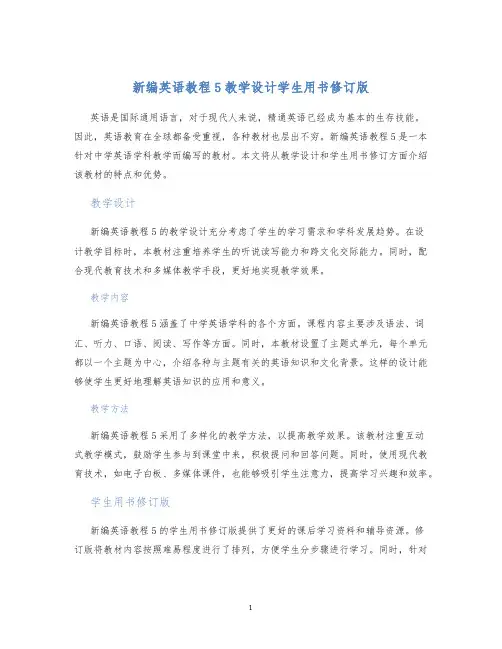
新编英语教程5教学设计学生用书修订版英语是国际通用语言,对于现代人来说,精通英语已经成为基本的生存技能。
因此,英语教育在全球都备受重视,各种教材也层出不穷。
新编英语教程5是一本针对中学英语学科教学而编写的教材。
本文将从教学设计和学生用书修订方面介绍该教材的特点和优势。
教学设计新编英语教程5的教学设计充分考虑了学生的学习需求和学科发展趋势。
在设计教学目标时,本教材注重培养学生的听说读写能力和跨文化交际能力。
同时,配合现代教育技术和多媒体教学手段,更好地实现教学效果。
教学内容新编英语教程5涵盖了中学英语学科的各个方面。
课程内容主要涉及语法、词汇、听力、口语、阅读、写作等方面。
同时,本教材设置了主题式单元,每个单元都以一个主题为中心,介绍各种与主题有关的英语知识和文化背景。
这样的设计能够使学生更好地理解英语知识的应用和意义。
教学方法新编英语教程5采用了多样化的教学方法,以提高教学效果。
该教材注重互动式教学模式,鼓励学生参与到课堂中来,积极提问和回答问题。
同时,使用现代教育技术,如电子白板、多媒体课件,也能够吸引学生注意力,提高学习兴趣和效率。
学生用书修订版新编英语教程5的学生用书修订版提供了更好的课后学习资料和辅导资源。
修订版将教材内容按照难易程度进行了排列,方便学生分步骤进行学习。
同时,针对不同程度的学生,本教材还提供了不同水平的试卷和答案,供学生自我检测和巩固所学知识。
学习资料新编英语教程5的学生用书修订版提供了各种课后学习资料,包括听力练习、口语练习、阅读练习和写作练习等。
这些资料能够帮助学生全面巩固所学知识,并提高实际应用能力。
辅导资源针对学生在学习中遇到的困难,新编英语教程5的学生用书修订版提供了丰富的辅导资源。
学生可以使用辅导材料中的例题、策略和技巧来解决自己的学习难题。
结语总的来说,新编英语教程5的教学设计和学生用书修订版确保了学生在学习过程中全面、系统地掌握中学英语所需的知识和技能。
采用该教材的教学机构和学生都可以在英语学习中取得更好的成绩。
《英语课程与教学论》教学大纲
《英语课程与教学论》教学大纲课程编号:12100917学时:32学分:2课程类别:专业方向模块课程面向对象:英语专业本科学生课程英文名称:The English Curriculum and Teaching Theories一、课程的任务和目的任务:通过该课程学习,引导师范生学习课程教学改革新理念,帮助树立交际语言教学观;学习语言学、心理学、二语习得等外语教学理论和外语学习理论,奠定良好的教学理论基础;学习不同的英语教学法思想,掌握英语课堂交际语言教学技能;组织学生参加英语教学实践活动,帮助学生理论联系实际教学, 培养学生实践教学和反思教学能力,逐步提高对英语教学的认识能力,从而形成个人所特有的英语课堂教学能力,为将来从事英语教育事业奠定良好的理论和实践基础。
目的:该课程旨在培养英语师范生具有英语交际语言教学观,具备在新课程改革的教学理念指导下的英语课堂交际语言教学技能, 为将来从事英语教育事业奠定良好的理论和实践基础,成为能够适应社会发展需要的合格的英语教师。
二、课程教学内容与要求1.绪论明确开设本课程的目的,介绍本课程的特点、体系及研究和学习的任务;使学生了解英语教师形成自己的教学艺术风格的途径。
2.外语教学法的主要流派,特别是交际语言教学法。
集中学习各种英语教学方法中的教学活动及其涉及教与学方面的有关问题,使学生了解各种教学法的原则和具体的操作方法,了解其优缺点,以便能在教学实际中选用正确的方法进行教学。
3.英语课程标准英语课程标准是教材编写,教学教研,测试评估的依据,因此全面细致地学习英语课程标准是首要工作。
通过学习,学生明确英语课程标准“新”在何处,了解英语课程标准的教学目的,教学要求和原则。
4.英语现行教材及驾驭教材的具体教学方法和技巧介绍中学英语现行教材编写的指导思想,要求学生掌握教材的基本特点。
在此基础上,介绍中学英语现行教材的具体课堂教学方法和技巧,要求学生掌握如何进行听,说,读、写技能的训练,如何进行词汇,句型、语法的教学,如何使用简笔画、电化设备等辅助教学手段。
英语课程与教学论教学大纲
英语课程与教学论课程教学大纲English Curriculum and Teaching Methodology一、课程性质与任务(一)课程性质本课程是为英语(师范)专业本科学生开设的教师教育类课程,是加强学生英语教学理论修养和基础知识的重要途径。
课程系统介绍中小学英语教学基础理论,将“课程思政”融入到教学中,将立德树人作为根本任务,以社会主义核心价值观为引领,培养具有崇高的理想信念、良好的师风师德和高度的敬业精神的应用型人才。
(二)课程任务通过本课程的理论教学使学生具备以下知识和能力:1.了解语言和语言学习的相关理论,认识外语教学发展史上主要教学流派的理论背景、教学原则、教学环节、教学设计等,学习语言知识和语言技能的教学方法、常见教学活动的设计与组织,掌握课堂管理的方法及新课标的评价方式;2. 掌握教学设计的方法,具有编写规范教案的能力;3. 能够依据自己的环境、特定的教学条件和学生的需求以及语言教学的规律,对教学方法和技巧进行选择和再创造;4. 结合语言知识、语言技能的模拟教学实践,达到熟练运用中小学英语课堂教学基本教学方法与操作技巧,逐步形成中小学英语教师应有的初步的教育教学能力、教学研究能力和教学实践能力;5. 形成中小学英语教师良好的职业信念和专业发展能力,热爱中小学英语教育教学工作,树立崇高的教师职业道德与教师职业信念,为成为合格中小学英语教师奠定必要的理论与实践基础。
6. 通过以小组合作形式完成实任务的方式提高沟通合作和解决问题的能力。
二、教学活动目标(一)课程目标通过本课程的理论教学,使学生具备下列能力:课程目标1:能够运用外语教学基本理论和外语学习理论,根据需要运用恰当的教学方法和技巧,具有编写教案、课堂管理和教学评价的能力。
(支撑毕业要求指标点1-4)课程目标2:未来能够成为具有良好的师风师德,较强的法制观念和诚信意识的合格的教师。
(支撑毕业要求指标点2-2)课程目标3:能够熟练准确地运用英语语言进行教学,发出课堂指令,恰当地对学生予以评价。
大学生新编英语教材
大学生新编英语教材随着社会的不断发展,英语作为一门重要的国际语言,在中国的教育体系中扮演着越来越重要的角色。
为了提高我国大学生的英语水平,我们需要一本全新的、符合大学生需求的英语教材。
本文将介绍大学生新编英语教材的内容和特点,以及如何更好地利用这本教材提高英语学习效果。
第一部分:英语基础知识新编英语教材的第一部分着重介绍英语的基础知识。
其中包括英语的语音、语法、词汇等方面的讲解。
在语音教学方面,我们需要注重英语音标的学习,以及发音错误的纠正。
在语法教学方面,我们应该引入一些常用的语法规则,并结合实际例句进行讲解和练习。
此外,词汇的积累也是英语学习的基础,因此我们需要设计一些有趣的词汇学习方法,帮助学生记忆和应用单词。
第二部分:听力和口语听力和口语是英语学习中最为重要的技能之一。
在新编英语教材的第二部分,我们应该加入大量的听力材料,包括长对话、短对话、听力填空等。
这些材料应该紧密结合生活实际,涵盖各个方面的内容,以提高学生的听力理解能力。
同时,我们还应该设计一些口语训练的活动,如角色扮演、小组讨论等,帮助学生提高口语表达能力,并增强他们在实际交流中的信心。
第三部分:阅读和写作阅读和写作是培养学生英语综合能力的重要途径。
新编英语教材的第三部分应该包含多种类型的阅读材料,如新闻报道、散文、小说等,涵盖不同的主题和风格。
这些材料可以帮助学生扩大词汇量,提高阅读速度和理解能力。
此外,我们还应该引导学生进行写作训练,包括写作文、邮件、日记等。
同时,教材中应该提供写作指导和范文,帮助学生掌握写作技巧和规范。
第四部分:文化和实践英语学习不仅仅是对语言知识的学习,还需要了解英语国家的文化和实践。
新编英语教材的第四部分可以介绍英语国家的历史、地理、风俗习惯等内容,以增加学生对英语国家的了解。
此外,我们还可以设计一些实践活动,如英语角、文化交流等,让学生有机会运用所学知识,提高实际应用能力。
结尾部分:通过编写一本适合大学生的新英语教材,我们能够更好地满足他们的学习需求,提高他们的英语水平。
英语学科与教学论教学大纲
英语学科与教学论教学大纲英语学科与教学论教学大纲教学大纲是一门学科教学的重要指导文件,它规定了学科教学的目标、内容、方法和评价等方面的要求。
在英语学科中,教学大纲的编制对于教师的教学工作具有重要的指导意义。
本文将从英语学科和教学论两个方面,探讨英语学科与教学论教学大纲的编制。
一、英语学科教学大纲的编制英语学科教学大纲的编制是为了明确教学目标、规范教学内容和方法,提高教学质量。
首先,教学大纲需要明确教学目标。
教学目标是教学活动的核心,是教师教学的出发点和归宿。
在编制英语学科教学大纲时,需要明确学生在语言技能、语言知识和语言意识等方面的发展目标,以及培养学生的跨文化交际能力和学习策略等方面的目标。
其次,教学大纲需要规范教学内容。
英语学科的内容包括语音、词汇、语法、听力、口语、阅读和写作等方面。
在编制教学大纲时,需要根据学生的年级和英语水平,合理安排各个内容的学习重点和难点,确保学生能够有系统地学习英语知识和技能。
最后,教学大纲需要明确教学方法。
教学方法是实现教学目标的手段和途径。
在编制教学大纲时,需要根据学生的认知特点和学习需求,选择合适的教学方法和教学手段,如任务型教学、合作学习、情境教学等,以提高学生的学习兴趣和参与度,促进他们的语言能力的全面发展。
二、教学论教学大纲的编制教学论是研究教学活动的规律和方法的学科,它对于教师的教学能力和教学素养的提高具有重要的作用。
教学论教学大纲的编制,旨在培养学生的教学思维和教学能力。
首先,教学大纲需要明确教学目标。
教学目标是教学论教学的出发点和归宿,它包括教学内容、教学方法、教学评价等方面的目标。
在编制教学大纲时,需要明确学生在教学思维、教学能力和教学素养等方面的发展目标,以及培养学生的创新精神和团队合作能力等方面的目标。
其次,教学大纲需要规范教学内容。
教学内容是教学论教学的核心内容,它包括教学理论、教学方法、教学技巧等方面的内容。
在编制教学大纲时,需要根据学生的年级和教学需求,合理安排各个内容的学习重点和难点,确保学生能够有系统地学习教学理论和教学方法。
- 1、下载文档前请自行甄别文档内容的完整性,平台不提供额外的编辑、内容补充、找答案等附加服务。
- 2、"仅部分预览"的文档,不可在线预览部分如存在完整性等问题,可反馈申请退款(可完整预览的文档不适用该条件!)。
- 3、如文档侵犯您的权益,请联系客服反馈,我们会尽快为您处理(人工客服工作时间:9:00-18:30)。
⑶Some people believed that the mind of human beings could be trained by logical analysis of the classic language, extensive memorization of complicated rules and paradigms and translation between languages.
(4)In the 19th century, more experts of foreign language teaching adopted the strategy of combining grammar rules with translation and the Grammar-Translation Method became the principal method of teaching modern languages in schools.
.
2
The nslation Method
1.Background 2.Theoretical Basis 3.Basis Principle 4.Summary and Comments
.
3
1.Background
(1)The history of the Grammar-Translation Method is not fully and carefully documented. However, there is evidence that grammar analysis and translation began to be the basic procedures in foreign language teaching from the 16th century.
.
5
2.Theoretical Basis
(1)Theory of language
The theory of language underlying the Grammar-Translation Method was derived from Comparative Historical Linguistics. (2)Theory of learning
language.
.
9
(3)Techniques
⑴Reading ⑵Translation ⑶Deductive teaching of grammar ⑷Analysis and comparison ⑸Memorization ⑹Reading comprehension questions ⑺Written work
⑴to read and translate its literature; ⑵to understand the target language; ⑶to help develop their minds; ⑷to gain a better understanding of the first
.
10
(4)Exemplification
⑴Phase One A.The teacher reads and explain the new words and
英语课程与教学论新编
——0903 赵蒙 020901101
.
1
Schools of English Teaching Methodology
The Grammar-Translation Method The Direct Method The Audio-lingual Method The Cognitive Approach The Communicative Approach Task-based Language Teaching
3.The major practice is translating from and into the target language.
4.The teaching focus is reading writing.
5.First language is the main medium of instruction.
The theory of learning underlying the Grammar-Translation Method was Faculty Psychology.
.
6
3.Basis Principle
(1)Main features (2)Objectives (3)Techniques ( 4 ) Exemplification
⑵The second impetus for the procedures of grammar analysis and translation in teaching Latin came from the social needs of European countries.
.
4
1.Background
6.The sentence is the basic unit of language teaching and learning.
nguage accuracy is emphasized.
.
8
(2)Objectives
The objectives of learning a foreign language in a Grammar-Translation Method classroom are to enable the learners:
.
7
(1)Main features
1.Grammar is the core of language, and language materials are arranged according to the grammar system.
2.The main teaching activities are analysis, explanation and translation.
